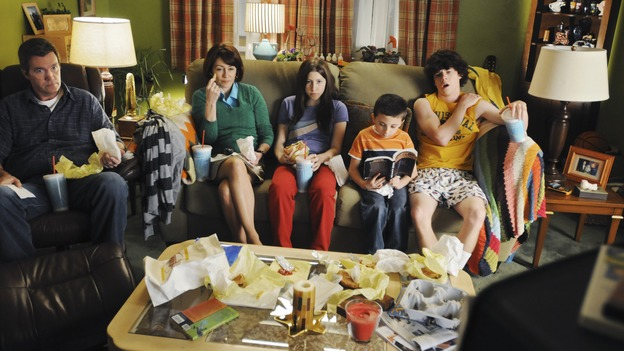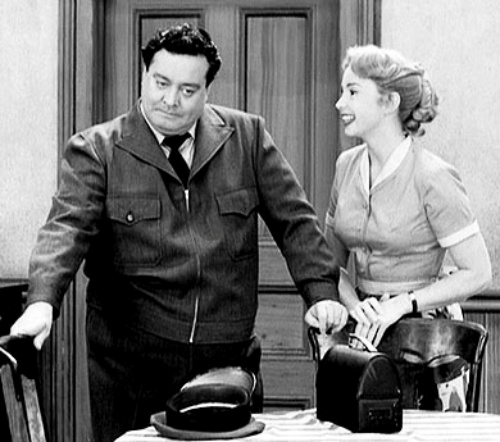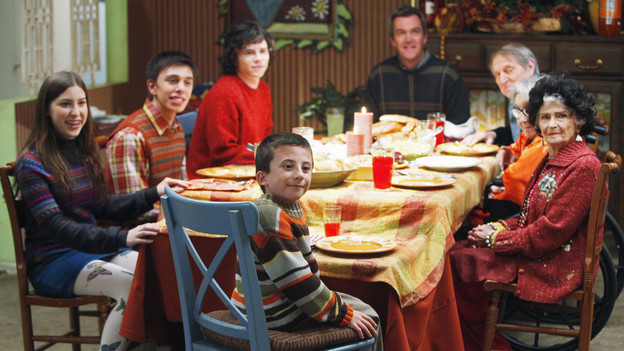ABC’s The Middle: Redefining the Working-Class Male
Kelli Marshall / University of Toledo

When it premiered in September 2009, ABC’s sitcom The Middle received overall positive ratings for its relatable situations, eccentric humor, and down-to-earth tone. More recently, critics have applauded not only Atticus Shaffer’s portrayal of 11-year-old Brick Heck, but also the show’s running commentary on our current dismal economy and skyrocketing unemployment rate, incidentally something for which the slightly more popular and hipper family sitcom Modern Family has recently been criticized. Still, some reviewers pan The Middle for its supposedly stock characters and clichéd sitcom situations. For example, one critic reports rather bluntly, “If you haven’t met these characters before, you don’t own a TV.” On the surface, the naysayers have a point. The family is normative (white, heterosexual, married, church-going); the parents are stressed; the kids are quirky; and the situational comedy often revolves around conventional family tiffs and misunderstandings. A closer look at The Middle, however, reveals that it is forging new territory, at least in terms of the representation of men in the working-class domestic sitcom.
According to the show’s adult stars, Patricia Heaton and Neil Flynn, the title The Middle refers to the middle of the country (the family resides in the fictional town of Orson, Indiana), middle age, and middle class. These first two descriptors are correct, but the third is questionable. Even Flynn doubts this label in an on-camera interview with TV Guide when he says that middle income or middle class is something “these people would be lucky to claim.” Indeed, one look at the Heck family’s 1970s ranch-style home, modest blue sedan, fast-food eating habits, unflattering clothes, and occupations (manager of a quarry and a used-car saleswoman) suggests that, despite its title, The Middle is not a middle-class American sitcom. To be placed in that category the show would need to feature relatively affluent settings, prestigious professions, and well-groomed characters like those found in Father Knows Best, Bewitched, The Brady Bunch, Family Ties, The Cosby Show, and Modern Family. But it doesn’t; rather, The Middle’s homely mise-en-scene and grassroots-type themes resemble those of working-class sitcoms like The Honeymooners, The Flintstones, All in the Family, Roseanne, The Simpsons, King of Queens, and According to Jim. As a result, we should analyze it as such.1
Richard Butsch has discovered that since its inception, the domestic American television situational comedy has relentlessly manipulated gender traits to suggest that the working class is inferior to the middle class.2 Working-class sitcoms, for example, traditionally feature incompetent, immature, and irrational husbands/fathers who have to be bailed out of inane (yet comical) situations by their capable, responsible, and logical wives (e.g., Alice and Ralph Kramden, Florida and James Evans, Marge and Homer Simpson). Middle-class family sitcoms, on the other hand, usually present both sexes as “a superb team […] intelligent, sensible, and mature,” and neither is devalued or revered in spite of the other (e.g., Carol and Mike Brady, Maggie and Jason Seaver, Claire and Heathcliff Huxtable).3

Based on its blue-collar mise-en-scene and themes, ABC’s The Middle — and Mike Heck (Neil Flynn) in particular — should take on the stereotypical character traits of the working-class sitcom. For example, Mike should lack good sense and engage in emotional childish outbursts, Frankie Heck (Patricia Heaton) ought to make up for what Mike lacks in intellect and maturity, and the Heck children — Axl (Charlie McDermott), Sue (Eden Sher), and Brick (Atticus Shaffer) — should best their father mentally and otherwise.4 But this is not the case. Instead, Mike helps his kids with their homework, coaches their spelling-bee competitions, and empathizes with their dating issues. As well, when Frankie has to work late on Thanksgiving and Christmas, he (along with other family members) prepares the turkey feast and shops for presents. Moreover, unlike his working-class sitcom predecessors, Mike responds wisely to delicate situations. For example, when Sue brings home her new boyfriend, whose effeminate mannerisms, interests, and clothes indicate he is gay, Mike suggests that he and wife hold off telling their daughter the truth: “She’ll figure it out eventually…or he will,” he counsels.5 Finally, in contrast to other working-class males like Homer Simpson and Dan Conners (Roseanne’s John Goodman), neither Mike Heck’s children nor his wife ever appears more intelligent or capable than he.6

So why this shift? Why would The Middle move away from the buffoonish male stereotype that the working-class sitcom has perfected over half a century? Why would it bestow traits of the middle-class sitcom father — self-assured, admired, competent — on its blue-collar character?7 Three words: the current economy.
The Middle is the only working-class situational comedy to premiere in 2009-2010, and it is the only non-animated working-class domestic American sitcom currently in production as well as the only one set in Middle America.8 One might say, then, that for good or bad, in contemporary popular culture The Middle alone signifies familial life in the Midwest. Now, consider the current unemployment rate: nearly 15 million people, the majority of whom live in blue-collar Michigan (14% jobless) as well as other Midwestern states like Illinois (11.2%) and Ohio (10.9%).9 If we reconcile these two realities, we might conclude that it would be mighty irresponsible and potentially risky of ABC to depict its sole blue-collar husband/father (and family) in the negative manner of the traditional working-class sitcom. Indeed, having a bumbling, unthinking, incompetent man represent the multitude of out-of-work and undervalued Midwestern blue-collar males at this time, in this economy, in this job market would be unquestionably insensitive and out of touch. It’s just a shame that such a positive modification had to derive from such a dismal real-life situation.
Image Credits:
1. The couch, fast food, and Dancing with the Stars: Dinnertime on ABC’s The Middle.
2. The Honeymooners’ Ralph Kramden, the original working-class buffoon.
3. Thanksgiving dinner, served up by Mike and the rest of the Heck clan.
Please feel free to comment.
- Other references to the family’s financial situation: because of cutbacks, trash pickup in Orson, Indiana only takes place every two weeks (“The Scratch”). The family shops at Frugal Hoosier, Indiana’s best “expired food” store (“The Cheerleader”). Mike and Frankie can’t afford a new dryer (“The Cheerleader”). An early anniversary present consists of a trip to the carpet remnant store in French Lick and an overnight stay at the Route 33 Motor Lodge (“The Floating Anniversary”). Other references to the grassroots framework of the show: Mike competes in “the Birchwood 500,” a three-lap race around the block on a riding mower (“The Block Party”). Brick and Axl venture through corn mazes (“Thanksgiving”). Frankie and Mike play Cornhole at a car-dealership BBQ (“Worry Duty”); and a later episode features the Heck’s eldest son, Axl, with his friends swimming in the Hecks’s above-ground pool, a style typically associated with the working class (“Signals”). [↩]
- Butsch, Richard. “A Half-Century of Class and Gender in American TV Domestic Sitcoms.” Cercles 8 (2003): 16-34 [↩]
- Ibid. [↩]
- Ibid. [↩]
- One reason that Mike is able to assist his family in these ways is that for much of The Middle’s first season he is unemployed. Granted, his joblessness is not a result of the failing economy but the discovery of a dinosaur bone, which prompts a four-month shutdown at the quarry so paleontologists can unearth more prehistoric treasure (what a nod to the show’s working-class sitcom predecessor, The Flintstones!). Still, Mike’s situation reflects the U.S.’s current layoffs and high unemployment rates, particularly those in the Midwest. In fact, one episode, “The Interview,” is devoted almost exclusively to how difficult it is for Mike to find a temporary position. [↩]
- Looking at the examples above, it appears that Mike Heck is the model husband/father/Midwestern male. But that is not quite the case; he (as well as Frankie) has faults, several of them. For example, Mike (as well as his wife) forgets his daughter’s birthday, cannot operate a computer, fails to fix the family’s lawnmower without help, chooses Final Four tickets over a family funeral, and occasionally lets his children’s immaturity and bizarre behavior get the best of his emotions. Still, Mike’s shortcomings are balanced with the positive characteristics mentioned above, which is not usually case for working-class male sitcom characters. [↩]
- Butsch, Richard. “Five Decades and Three Hundred Sitcoms about Class and Gender.” Thinking Outside the Box: Television Genre Reader. Gary Edgerton and Brian Rose, eds. Lexington, U of Kentucky P, 2005, 111-135. [↩]
- Of course, there are non-animated working-class family sitcoms in syndication (e.g., Roseanne, According to Jim, Still Standing, Everybody Hates Chris), but The Middle is the only one currently in production. [↩]
- The Bureau of Labor Statistics (April 2010): Employment Situation and Regional and State Employment and Unemployment Summary. [↩]
Just thought I’d share a comment/tweet from Charlie McDermott, who plays Axl Heck on THE MIDDLE:
Just thought I’d share a comment/tweet from Charlie McDermott, who plays Axl Heck on THE MIDDLE: http://twitter.com/charliemcdr.....5445279975
Kelli, this is a timely and well-written article. With so many great working class families throughout the years, I wonder why The Middle is the only one currently in production? Hmm…
Also, in his 2003 article “Ralph, Fred, Archie, and Homer: Why television keeps re-creating the white male working-class buffoon,” Richard Butsch discusses the persistent images being produced by networks as a form of risk avoidance. He argues that networks often play it safe and that means staying with what works. So, you bring up an excellent question as to why the change. Why is Mike Heck a working class male without the qualities of being “dumb, immature, irresponsible, or lacking common sense” (Butsch as cited above).
You argue the current economy is the cause of this change. I would contend your argument is a valid one, but I ask if the state of the current economy is the only potential cause of this change? Many arguments are made in current literature that the definition of masculinity itself is in a state of “flux.” Could that also be a cause for this change? Today’s males are not like their fathers. Hegemonic masculinity and its traditional attributes of “authority, power and possession” are no longer the norm and today’s modern male is allowed to be more emotional, sensitive, outwardly caring, etc… The new modern male more closely resembles attributes held by characters such as Cliff Huxtable or Mike Brady. So, maybe the working class male has evolved into what was formerly the middle-class male. (If this is the case, maybe an examination of representations of middle class males to see if they have changed or remained the same would be appropriate.)
Could this change be a result of changing ideologies regarding gender? Could this show be breaking new ground and an attempt by ABC to take on a little more risk? The Middle premiered at the same time as Modern Family and Cougar Town. Perhaps this allowed them a little more leeway to test something new and if it failed the repercussions would not be as great with the potential of success with two other series to soften the blow of a failure?
Hi, Evan:
Thanks for reading — and for the kind comments!
An early draft of my essay actually considered what you’re suggesting above — that THE MIDDLE also potentially opted for this change because “the definition of masculinity itself is in a state of flux.” Sheesh, it’s always in a state of crisis, isn’t it?! =)
However, I didn’t go there, so to speak, for two reasons: first, I ran out of space (!); second, if I had to choose one, the argument about the economy weighs more heavily, at least with this show anyway. For example, the two creators/writers of THE MIDDLE — both of whom are from the Midwest — have mentioned repeatedly in interviews that initially “interest [for the pilot] was lukewarm.” But then, they claim, “the economy tanked, and a show about a family struggling made it more relevant. […] This is a show about a family in the middle of the country that is not thinking about therapists or debating whether or not they have the right nanny.” More here: http://www.washingtontimes.com.....s-comeback. In other words, from its beginning THE MIDDLE appears to have been primarily anchored in concerns about our troubled economy.
While writing this column, I also thought about your question re: the current representations of middle-class fathers/husbands and wondered if they’ve really changed any. Foremost in my mind are the (upper-)middle-class men from MODERN FAMILY, Phil Dunphy in particular. He functions more like the buffoon of the working-class sitcom; he’s essentially a man-child, nothing like Mike Brady, Cliff Huxtable, or Mike Seaver (GROWING PAINS). But again, I ran out of space. Perhaps another essay… =)
Thanks again for the dialogue!
Pingback: ABC’s The Middle: Redefining the Working-Class Male « Kelli Marshall
Pingback: ABC’s The Middle: Redefining the Working-Class Male | Unmuzzled Thoughts (about Teaching, Shakespeare, and Pop Culture)
As Evan said above, a great and timely article, Kelli!
Your article has me thinking about The Middle‘s more immediate antecedent, too: Malcolm in the Middle. While Bryan Cranston’s Hal was certainly not the intellectual superior in that family, I do remember him being the main caregiver in the family, which seems to fit with some of the characteristics of Mike Heck that you describe.
Thanks, Charlotte! I have to admit that I’ve never seen MALCOLM IN THE MIDDLE. =( I’ll have to check it out sometime.
Pingback: Redefining the Middle Class - Reflections of the New Poor
Pingback: GLEE’s Unevenness Explained | Unmuzzled Thoughts (about Teaching, Shakespeare, and Pop Culture)
The Very best sitcom on t.v. and maybe in the history of sitcom. I don’t know who writes for them but the subtle humor is incredible. I think you have to be a semi inteligent person to watch the show and when you discover that Fox News is the #1 News broadcaster in America it may signalthe death nell for Middle.
Pingback: Identity Discrepancy According to the Audience | TV Families
Pingback: Comic Conversations and Jerry Seinfeld’s Comedians in Cars Getting Coffee | MediAcademia
First of all, the episodes are hit and miss, in my opinion to where I’ve turned off tv in the middle of some episodes. I’m not sure that this family is middle class. I mean, they can never do anything because Mike is too busy bitchin about his job and drinking beer in front of the tv. Anytime there is something in the house that breaks down, you can count on Mike to pass over it. Frankie is borderline mental hospital material. Yeah, they seem to love their kids, but it’s mostly about Axel at the expense of Sue and Brick. If I were married to someone like Mike, we’d have to have a talk about his lack of interest .
I think this show is the greatest sit-com, I hope it goes on for years. It’s nice to see a show with real people like Frankie over-reacting or reading something and trying to make things perfect, I’m like her. I would love to be married to a guy like Mike he puts up with so much from his wife, but I think she really is like a real official wife & mother just no other shows show that. I love Brick, he’s quite the character, Sue drives you crazy but in a funny way and Axle is a typical teenager especially when he tries to con his parents, I have a friend with a son just like him, it really hits home for me, First real sit-com with real people that I love & I also think it’s great that it doesn’t deal with serious bad issues, those things are meant for a drama, this is a real comedy that I truly will miss if it ends. I would love to see more of Brooke Shields as Rita Glossner,